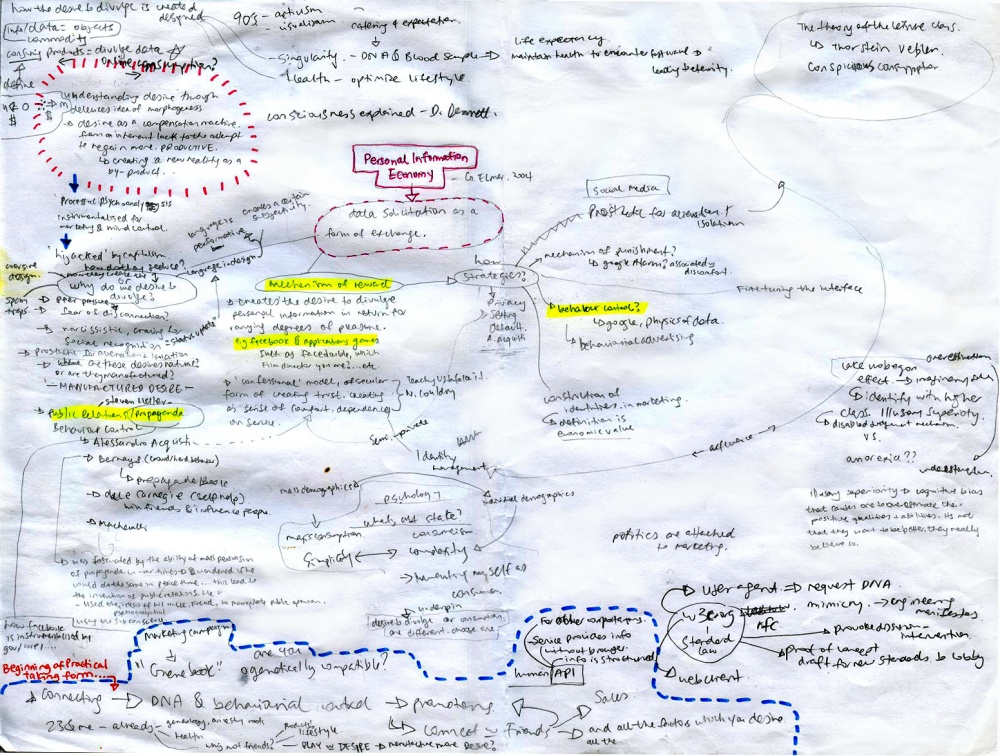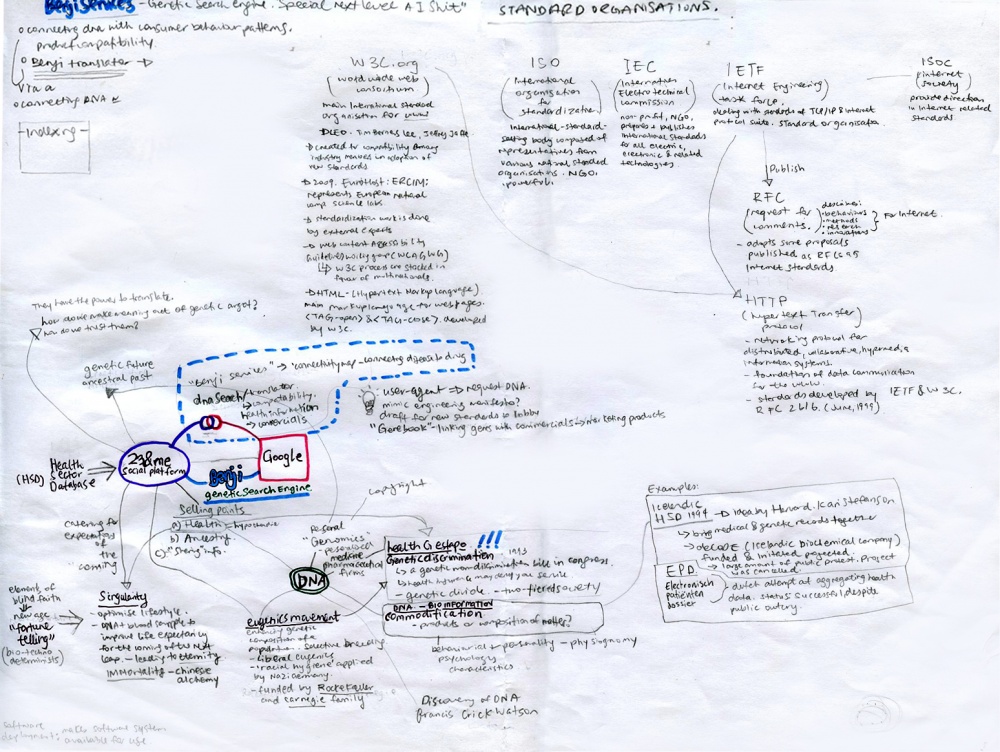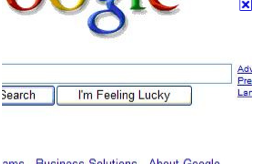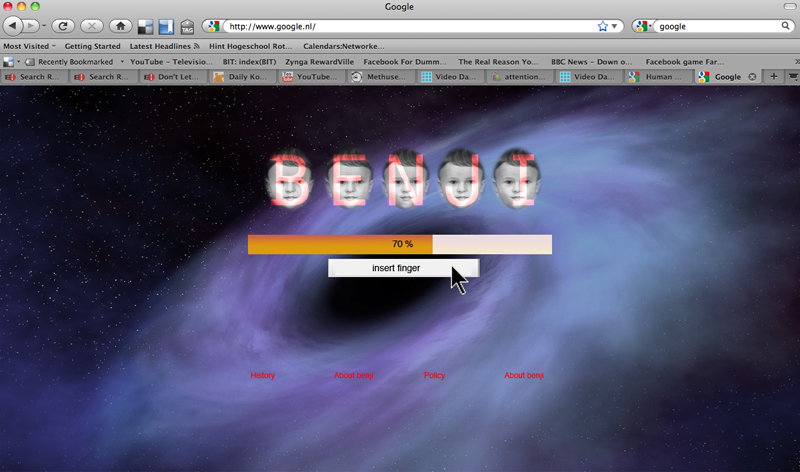User:Amy Suo Wu/benji: Difference between revisions
Amy Suo Wu (talk | contribs) No edit summary |
Amy Suo Wu (talk | contribs) |
||
| Line 127: | Line 127: | ||
amazon API research. eCommerce, now called 'product advertising' API | amazon API research. eCommerce, now called 'product advertising' API | ||
* [http://aws.amazon.com/code/4373 possible codes] | * [http://aws.amazon.com/code/4373 possible codes] | ||
* [http://pyaws.sourceforge.net/ python wrapper for latest Amazon Web Service] | |||
Revision as of 22:21, 30 March 2011
brain storm
 mind map of key ideas for essay and thematic project
mind map of key ideas for essay and thematic project
 mind map of the branches and interconnections between DNA, google, 23andme.com, network, standard organisations etc.
mind map of the branches and interconnections between DNA, google, 23andme.com, network, standard organisations etc.
research
Fictitious picture of Benji Brin, child of Sergey Brin (co-founder of google) and Anne Wojcicki (co-founder of 23andme.com). Powered by facial recognition software, this image is generated from website makemebabies.com, which takes facial elements of each parent and recombines it to create a representation of their baby.
The birth of the idea was inspired by the private lives of the owners of internet giants, namely google and 23andme.com. From the mind maps I imagined a genetic search engine that scans and reads your DNA and matches you with services products, consumer and sale data.
- On the one hand I want to highlight and problematise the activities of centralising health and DNA records and the consequence of genetic discrimination as witnessed during the eugenics movement earlier on last century.
- On the other hand, what is also interesting is the kind of reverence to the mysterious power of the veiled search engine. It is veiled because the inner-workings of the search results powered by secret algorithms are guarded by walls. Reflecting the incidental supernatural function that users imbue in search engines or perhaps technology in general, I would like to explore the systems and mechanisms of the belief similarly experienced through horoscopes and fortune telling. Perhaps trivial, though compelling, empathy and the desire to relate plays a major role. Psychologically, it functions as a kind of self fulfilling prophecy, a desire which preempts and causes realities. It is because of this nature of willingness to trust that creates the possibility and accessibility to discriminate.
small diversion
<nettime> Geert Lovink interviews Christoph Spehr:
"Science fiction is focused on possibilities, on desires, and on the social. It is a very powerful language. By changing and shifting the face of reality as we know it, it highlights the underlying structures of this reality, so you can say very rude things in that language. While changing the circumstances of 'normality,' it still pictures us as real human beings, as interacting with others, as collectively acting people; so when you run a political utopia through science fiction, it shows all the problems and conflicts that come from the fact that you're dealing with real people. By treating our reality as a past, it looks to that reality from a distance shows it as something that can be changed, and changes constantly anyway. It is quite subjective, but not to that extent like other pop languages." - Christoph Spehr
I flirted with the thought of creating a string of narratives to better illustrate and embody the loose collection of ideas floating around in my head. Imagination lends itself the power of science fiction, rendering mental visual worlds so that may leave imprints in your memory. After attempting to write, I only managed to define the structure and think of one scenario. Though I didn't pursue this venture, I used the core elements as a point of departure for the continuation of the first ideas mentioned.
///////////////////////////////////////////////////////////////////////////////////////////////////////////////////////////////
defining the city walls:
imagine a world where privatized companies have learnt fully decode and understand the human DNA imagine a world where all the DNA of the known world is aggregated and databased into a centralized network that is owned by one superpower. imagine a world where this superpower has learnt how to control the switches of parts in the DNA which govern the senses. Where it is possible to temporarily numb them by default at birth.
In this world the dominant ruling superpower is benji. benji is the corporation and the corporation is him. A paternal oppressor with a mind of a infinitely infantile CEO, he comes from the linage of corporate royalty. Just as dynasties strategically arranged marriages throughout history, a new political and economic power forged when his father married his mother bringing together the empire of Google with the empire of 23andme.com. This merger grew as benji grew, side by side benji's operational method inherits and reflects both his parents specialties: it is the leader in the field of genetic search engines. This grand expansion of territory, wealth, networks and power became to be known as benji.com.
In this world, citizens do not have full rights nor access to their genetic information. It is the property of benji, and following the legacy of Google's mysterious search algorithm, DNA has become something of a myth. It is known of it, but no one can prove its existence as the inner workings of other side is deemed inaccessible. Only machines and family of benji have knowledge. The citizen's DNA is scrutinized, cross-referenced, researched..etc to such a degree that benji has mastered behavioral conditioning and able to preempt every decision. benji can predict and prevent by calculating your genetic code. It can also easily incriminated and discriminate, which is does very often.
In this world, to access the internet of things (knowledge fountain), you must use your DNA as a key. Your identification is your genetic code. Without providing a sample of it, you are denied access to society and will be ostracized. There is no other choice than to comply.
///////////////////////////////////////////////////////////////////////////////////////////////////////////////////////////////
possible scenario when using benji, a machine of mysterious and discriminating delight :
you sit down and the website opened is benji.
it is a new but strangely familiar interface.
you are curious, so you browse around the website to explore it a little more.
you click on the 'about', button.
It tells you that about this new product and what it can do for you.
Convincingly it continues to tell you its advanced DNA decoding capabilities not only for
health purposes and family ancestry but also able to cure consumer craving and offer you wonderful targeted ads.
You get become more interested and maybe disturbed? ...
there's a 'insert finger' button and its looking straight back at you.
you click it and it tells you very politely to put your finger in the fingerprint scanner to log in.
hesitantly, you do it and something lights up.
it takes a few seconds to scan, register and compute.
possibility of two options:
1) you are accepted: according to us, you have the correct bio-information.
--> you may continue on to search or query in which a list of commercials based on the behavioral information gathered from DNA will be presented to you.
2) you are denied: according to us, you have the faulty bio-information.
--> your access is blocked.
back to research
"It used to be that you could go to Google.com, type a search query into the search box and then, by clicking 'I'm feeling lucky,' go directly to the page that would have been listed as the top search result." - Nicolas Carlson, businessinsider
This button is a remnant of google's old model - a feature that would bypass the search list and thus advertisements, taking users directly to the first hit of the search result. It conjures up the delightful aspects of games played in childhood such as 'lucky dip or the speculative thrill experienced in roulette. The language calls up the anticipation of an awaiting prize on the other of the concealed box and the seeming randomness triggers excitement and wonder. In pondering about the emotions evoked by this simple feature, the / La Bocca della Verità (in English: Mouth of Truth) came to my mind. Despite it's ambiguous origins, this fountain has now adopted the paranormal role of a lie detector. Seeing the commercial potential of such an enchanting role, this idea was taken further and turned into a fortune telling machine in 1981 by /DPS-Promatic, an Italian company designing and manufacturing amusement machines. The idea of sticking something of your physical body and inserting a coin into an inanimate device metaphorically breaks the membrane containing each entity. This physical gesture, similar to the effects of a placebo, serves to emotionally bind the user to the machine in the hopes of simulating a glimmer truth. Rationally, the fact that it is an illusion is common knowledge, however what is important here is the irrational pleasure experienced. This is what DPS-Promatic understand well.
In 2010, google replaces the 'I'm feeling lucky' button with 'insert coin' button to mark the anniversary of the game pacman. After pressing the 'insert coin' button users can begin playing a game of pacman. Again the element of game and analogy of animating a machine resurfaces and links directly with the Mouth of Truth game.
LINKS:
- holy shit! discovered this too late to do anything with it but super interesting that the genome of Jay Flatley is available on amazon!
- DNA protection
- immortality
- Illumina, another gene sequencing company
towards the final outcome
Key words: reverence, mystery, discrimination, excitement, black box power, advertising, desire, belief, DNA, personalised data, access
Mock up of the possible login interface of benji.
- Step 1: By inserting your finger into a device, the browser should automatically detect the presence of DNA and 'decode' it.
- Step 2: If the user is considered worthy, they will be granted access and the next page shall load. (if access denied, see step 5)
[insert mock up image]
- Step 3: Users may then continue to search or query on where only the 'I'm feeling lucky' button is available to click. As an inverse to googles' i'm feeling lucky' button, benji will bypass the search list and instead take you directly to the advertisements.
- Step 4: The first X amount of results will be pulled from amazon's search engine using their eCommerice API and fed back into the benji website as personalised advertisements. alternative system
- Step 5: If the user is considered unworthy, the internet connection will be cut. Perhaps this may determined by a person, human intervention may render its injustice and arbitrariness. However the rules in which are applied to discriminate should remain consistent, and so shall the users.
technical
amazon API research. eCommerce, now called 'product advertising' API



